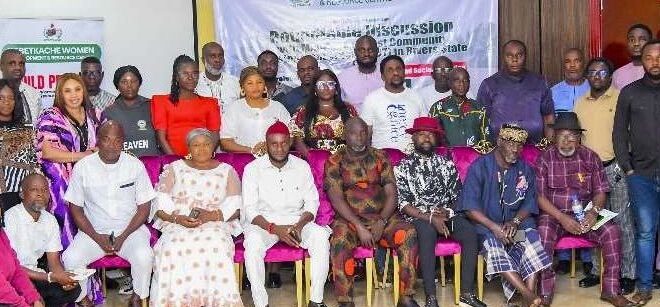By Kelechi Nwaucha
Representatives of over twelve Host Community Development Trusts in Rivers State on Thursday, joined members of the academia and civil society groups to discuss the role of HCDTs in the socio-economic development of their communities, including issues of social inclusion and community needs assessment as captured in their operations.
The two-day event in Port Harcourt, organized by Kebetkache Women Development and Resource Centre, with support from Ford Foundation, began on Thursday with the theme: ‘Roundtable Discussion with Members of Host Community Development Trust (HCDT) in Rivers,’ with focus on the Petroleum Industry Act (PIA), Gender Equality and Social Inclusion, and Community Needs Assessment.
Program officer at Kebetkache, Mrs Idongesit Smart, who spoke on behalf of the executive director, Dr Emem Okon, noted that HCDTs are by law expected to facilitate the development of their communities. She however added that the task before the roundtable was to examine how suited, given their governace structure and legal provisions, the HCDTs are to aid the development of these communities.
Particularly of interest to Kebetkache, is the inclusion of women in the operations and governance structure of these HCDTs, as well as the organization furthers its objective of promoting women’s participation in natural resource governace.
Mrs Smart lamented the gender imbalance apparent in the composition of the boards, management and advisory committees of most HCDTs represented at the roundtable. A Q&A session at the event uncovered the sad reality of a less than 30 percent representation of women in governance structure and operations of the HCDTs.
She noted that Kebetkache, from its research, discovered that the HCDTs “comprised of mostly men. Women are not being involved in the HCDTs. You know, in the HCDTs, we have the board, the management team and the advisory team. But we discovered that in all these, women are not members of the different committees.
“So we (Kebetkache) decided to hold this two-day meeting, to sensitize the members of the the HCDTs, that there is need for them to involve women in the different committees. Because when we talk of needs assessment, which the HCDT has to conduct to know the needs of community members before they can carry out any project, if women are not in these subcommittees, who will be able to project the top priority needs of women?
“You know, as a man, you might not really know what a woman needs. You may think my need is water. But, what my need is, maybe something else. So that is why we feel it is very important for women to be members of these committees in HCDTs,” she said.
Mrs Smart further stressed the imbalance in composition, pointing out that “If you look at what happened we asked a question here, how many men, how many women are in the HCDTs? We heard that of 17 members, you have one woman. Of a five-person team, you have one woman. Of 17, you have one woman. It doesn’t make sense because one man, one woman cannot make the difference in that team. Some HCDT’s don’t even have a woman at all.
“I’m happy that some of them that attended this training have said that it is an eye-opener for them, and they will be able to go back to their different communities to advocate that women are made part of these committees,” she said.
Delivering a paper on ‘The PIA and the HCDT: Framing Strategies for Inclusive Community Development,’ Dr Tubodenyefa Zibima, deputy director, Institute for Niger Delta Studies (NDS) at the Niger Delta University (NDU), pointed out that “the Host Community Trust Fund is a component of the Petroleum Industry Act and essentially what it represents is a formalization of the GMOU system that maps out how oil companies implement their corporate social responsibility.
“So as it’s now, it’s no longer getting social license to operate, it is a legal obligation that mandates oil companies to dedicate 3% of their OPEX, which is the operations expenditure annually, to developing the communities where they operate.
“And the HCDT, the objectives, basically spell out how to develop these communities, sectors to focus on social, economic, educational, environmental and stability. So it behooves on the board of trustees, the management committee, to work with the HCDT and the advisory committee, which are basically the implementation mechanisms for the HCDT, to practicalize and convert this into implementable policies and interventions in these communities.”
Dr Zibima noted the importance of Community Needs Assessment, as enshrined in the PIA, adding that “the PIA provides, even before all of this, the settlor is mandated to carry out a community needs assessment. And it is based on the identified needs of specific communities that the trustee is required to implement.
He noted the challenges before HCDT committee members in efforts to operationalize the provisions of the Act, while advising them to be proactive, especially with regards to full community participation in achieving the Community Needs Assessment, which he described as “the veritable first step in developing the community.”
Commenting on what he described as ‘Negative Equilibrium,’ Dr Zibima noted that, “the idea with any one system is that it operates optimally, and by operating optimally, it keeps the system in equilibrium, which is functionality, enabling it to achieve the purpose for which it exists.
“Now, the HCDT exists to develop communities, but when you take a closer look at the actual operations of HCDTs across the Niger Delta states, you will find that they have bought into completely the malfunctional logic of development that is hinged on renovating schools, paving internal link roads, and repainting, building town halls and stadiums, many stadiums
“Now, while all of these are good for communities. These do not, in the way which the HCDT is intended, do not contribute to community development. So, when we talk of community development, we begin to look at issues of economic development, economic empowerment, social development, political and infrastructural.
“So, even when we talk of infrastructural, we should look at infrastructures that objectively contribute to improving the quality of life in these communities,” he said.
Chairman of Bille HCDT, in Degema Local Government Area, Ibinabobo Sanijie, said “the lectures were very good and impactful. But the only problem is that, like every other lecture, we could not arrive at solutions. A lot of problems were enumerated. But the solutions are very difficult to come by, because of the law and the implementers.
“The law said the settlors will do everything. So if the settlors will do everything, they do everything according to what they want to do. And they are in control. Even today they are in control, we know that. So we couldn’t get full answers. But the lectures and the impact was very good.”
On the issue of inclusion for women, especially for women, Sanijie said “for my board we have women. Out of five men for the board, we have one who is a lady. For the management committee, we have two out of seven, and for the advisory committee we have two women out of six.
“So I don’t think it was a problem for us. The community actually spread it for us in our community in our acdt so we didn’t experience that kind of problem but it was good because we take it back to the community so that at least next time when they’re doing everything they have to capture them very well and that was what we are all agreed
Another participant, West Tamunoemi Alabo, Buguma DAA 3 Cluster Management Committee member, said “the event is a mind-blowing one. Today, we’ve learnt some things that ordinarily have been giving us issues in our various communities, in our various clusters.
“And we are taking on some of these things to see that at the end of the day, we develop our community and see that that which is meant to get to the community actually gets to the community.
“I also want to thank the organizers of this program. I want to thank the organizers, Kebetkache. They’ve done a wonderful one. if we should have organizers like this, more often to talk to us, I think the various communities will even develop more than the way they are doing,” he said.
Papers presented at the roundtable include ‘Capacity Building Training for Community Leaders on Gender Equality and Social Inclusion in Rivers State,’ by Mrs Idongesit Smart and Mrs Idongesit Alexander.
 PH Mundial – Port Harcourt Online Newspaper News Across The Region
PH Mundial – Port Harcourt Online Newspaper News Across The Region





